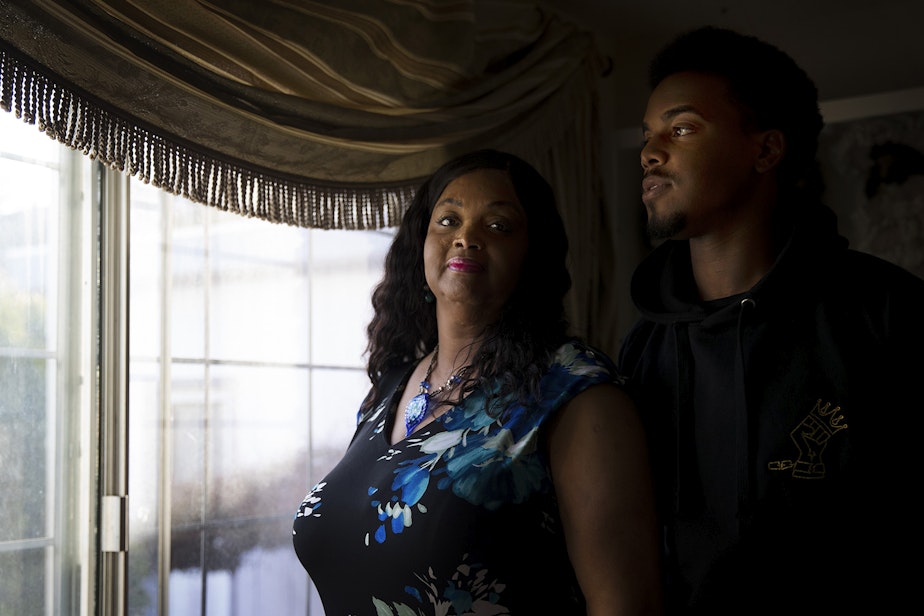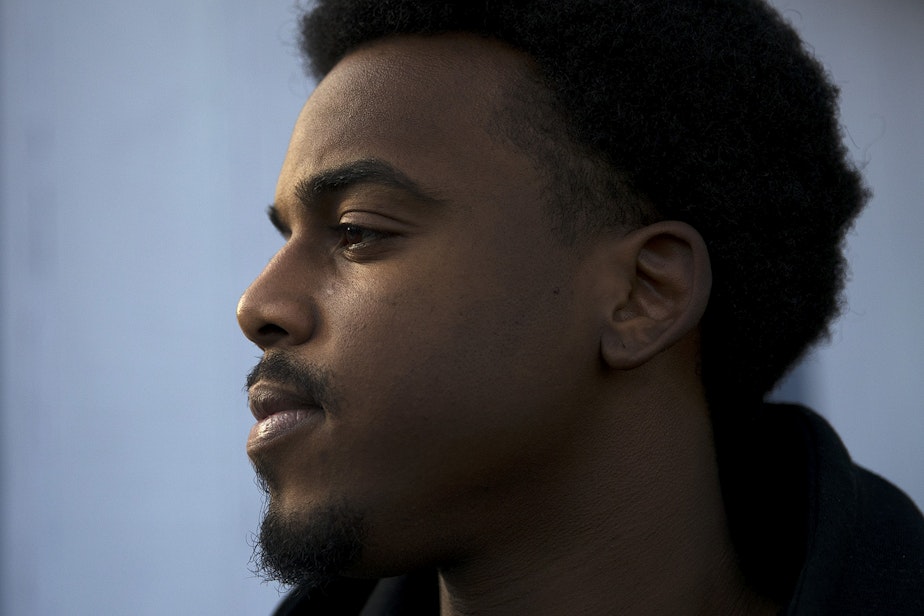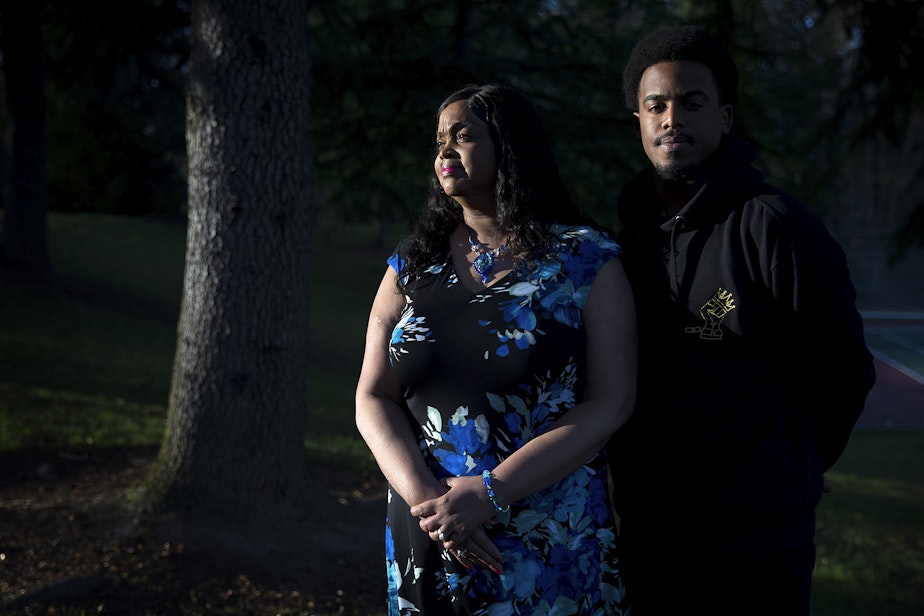Their smiles were 'defiant.' A cop puts a young black man in a chokehold

Josiah Hunter was 21 when the skinny cop with orange-red hair put him in a chokehold and yelled, his breath hot on Hunter’s ear, “Stop resisting arrest!”
Hunter didn’t feel like he was resisting arrest. He felt like he was resisting death. He couldn’t breathe.
The cop had him pressed against his dad’s dark cherry Cadillac Seville. Hunter tried to talk, but what came out sounded like a squeal. He counted … 5 … 6 … 7 … his legs wobbled. His body started to sink. And then the cop released him.
Police had never bothered Hunter before. He was baby-faced and shy and had never been arrested. This? It made no sense. He’d been helping people 20 minutes before. What was happening?
There was a lot Hunter didn’t know that night … like that the cop who had choked him had put at least 13 other people in chokeholds, and that nine of those people became unconscious.
He didn’t know that this hold was banned in New York City and considered a “strongly disfavored” form of deadly force in Seattle … or that Federal Way had been sued over use of force before.

I
t was a hot night in September 2014, the dog days of a summer that would see the deaths of two black men at the hands of police … Michael Brown, 18, shot in Ferguson, Missouri, and Eric Garner, put in chokehold in New York. The officer in that case is currently on trial.
On that Sunday evening, Josiah Hunter and his best friend Junior Beausilien drove to an ampm gas station in Federal Way, a working class suburb of Seattle with a population of 97,000.
Hunter bought a Black & Mild cigar, which he smoked with Beausilien in the parking lot. As he settled back into his dad’s Cadillac Seville, he heard a bang, like a clap of thunder, as a drunk driver slammed his Dodge Ram into a pole. Hunter and Beausilien ran to the crash. They cleared a bumper and large piece of glass from the road and waved by traffic.
Sponsored
When Officer Kris Durell arrived, he didn’t see good Samaritans. To his eyes, Hunter and Beausilien were interfering. Durell suspected that Hunter was stealing the drunk driver’s wallet. Even the young men’s smiles were deemed suspicious by police.
“They smiled at Officer Durell,” attorneys for the Federal Way Police Department later wrote in a court filing. “Their smiles were not friendly; they were defiant.”
Another officer, Keith Schmidt, arrived. Schmidt talked with Durell, then walked into the ampm. When he emerged, he said the clerk wanted Hunter and Beausilien off the property. They were trespassing, he said.
Hunter left, but then looped around the parking lot to return to his dad’s car … even though that meant walking back onto the ampm property.
Officer Durell, according to his attorney, thought Hunter was coming toward him from behind.
Sponsored
And then, blink of an eye, Hunter said, he was under arrest, Durell’s bicep squeezed against his throat, his elbow lifting …
Hunter and Beausilien spent that night in jail. They slept on the floor because there were no beds available. “I didn’t understand how somebody could get arrested for helping,” Hunter said.

W
hile Hunter would later describe the arrest as shocking, the incident fits a pattern of violent interactions between Federal Way police and bystanders who cross their path.
Sponsored
The department has drawn at least 11 civil rights lawsuits over the last two decades, which have gone largely unnoticed by media. The U.S. Department of Justice, which spent a decade investigating and monitoring excessive force by the Seattle Police Department, hasn’t taken notice either. And without an independent review board, Federal Way police are left to police themselves.
Chief Andy Hwang said the department does that well. His force is nationally accredited, he said, and he meets with an advisory group called the “Chief’s Call.” Hwang also said that use of force by Federal Way police went down 25 percent in his first three years as chief.
“We believe our training and other efforts are working,” he said. “We place a lot of effort on de-escalation.”
Suburban departments like Federal Way “could be low-hanging fruit in reform,” said Professor Peter Moskos of John Jay College of Criminal Justice, but “nobody seems to care.”
Moskos, a former cop himself, said that “people in cities like Seattle and New York bitch all the time” about how police treat them, which is partly why big cities get more attention.
Sponsored
A shortage of qualified police makes it difficult for suburban departments to sideline problem officers. Talent follows money, and starting cops in Seattle earn $6,400 more than Federal Way cops. Seattle sweetens the deal with a $7,000 hiring bonus.
State and federal regulation of local police departments is minimal, and in jurisdictions where local governments haven’t created civilian oversight organizations for their police departments, police misconduct often gets addressed only when it draws a lawsuit or protest.
Top brass in Federal Way have noted this in the past.
In 2013, before Durell put Josiah Hunter in a chokehold, Chief Brian Wilson told the police guild, “While public mistrust, or media attention, or questions regarding the credibility of the police department and/or Officer Durell have generally not occurred as of today, they may occur in the future.”
The current chief, Andy Hwang, defended Durell as a stand-up officer.
"He's educated. He is a hardworking, dedicated, and loyal employee,” Hwang said in an interview last week at the Federal Way police headquarters. “He's a valued police officer who's making positive impact in our community each and every day.”
Chief Hwang said that Durell is polite, calls him sir, and will respond to medical calls … not something all officers do.
“Now I'm not going to tell you that any person is perfect all the time,” Hwang said. “But my assessment of Officer Durell is that he's a good officer, he's a proactive officer who wants to make a difference.”
Durell chose not to be interviewed for this story.
O
n that Sunday evening in 2014, Sanetta Hunter looked at the clock. Eleven p.m. It wasn’t like her son to stay out this late, but she tried not to worry.
“I figured Joe must have fallen asleep at a friend’s house,” she said. It didn’t occur to her to check the jail, where her son lay on the floor with a thin blanket.
Josiah Hunter said he felt lost that night, thinking the same thoughts on a loop: “I can’t believe I’m in jail right now … I’m pretty sure if I was white, this is not how it would have gone.”
Sanetta Hunter went to the police station that week to get the police report. She bumped into Ernest Sanders, then an officer with Federal Way.
“I just told her, based on what I thought, and what they were saying, that there were two sides to every story,” Sanders told KUOW.
He said he wouldn’t have put Josiah Hunter in a neck restraint, based on what he knew about the incident. “It would have to be a whole lot more extreme, something I thought was threatening another officer or something,” he said.
Sanders didn’t like working for the Federal Way Police Department, which he described as nurturing a culture of “blatant racism.” He said he was one of two African-American officers at the 130 member department. (There are now six black officers.)
Sanders said his nine years in Federal Way were the worst of his life. He was a school resource officer, but was removed after a student said he made inappropriate comments and tickled her ribs.
His marriage fell apart, and he felt alone on the force. Other officers would not respond to his requests for backup, he said. One time, after calling for help with a drunk driver and getting no response, officers from Tacoma showed up.
Another patrol officer of color supported this claim, according to records, saying that members of the squad seemed to disappear between 9 p.m. and midnight. Sanders also believes that Federal Way officers were cruel to people of color.
“I questioned how the officers there treated minorities, and not just blacks, but any minorities,” he said.
“There was a Hispanic Mexican guy arrested … and by the time we got there to assist, the guy was in handcuffs and sitting in the back of the car,” Sanders said. “When he got out, he had a frickin’ shiner on the side of his head. The guy was yelling and screaming about the officer assaulting him. I was like, shit, this has got to be legit.”
Chief Hwang said he had a “really good working relationship” with Sanders but that he would “emphatically deny” that Federal Way has a culture of racism.
“Racial bias, harassment, any of that, is not going to be tolerated in the Federal Police Department," Hwang said. “The success of this organization entirely depends on maintaining trust with our citizens.”
O
fficer Kris Durell, 35, grew up in Las Vegas and moved to Washington state as a teenager. He joined Federal Way police as a rookie cop in 2007 and became a defense tactics instructor two years later.
As he taught others to defend themselves, his personnel record grew thicker with reprimands and investigations.
There was the time Durell got in trouble for saying that he could not control his use of force.
“People try to fight me,” he said in a radio message to another officer in 2012. “All self-defense, bro.”
When an investigator later asked him what he meant, Durell elaborated. “It does appear to me that people have tried to fight me, whether they’re intoxicated or they do not like the look of me,” he said.
The investigator asked if Durell thought people on the street fought him more than other officers. “Sometimes, yes, sir,” Durell said.
Durell once entered a house without a warrant – and handcuffed the resident who would not let him enter. The department issued a legal refresher after that incident. Durell has also been reprimanded for five car crashes that were preventable. He was suspended for 10 hours after the fifth time.
Durell has used physical force on at least 22 people since 2012, records show. This is about average for police officers, although departments differ on how they define force.
Two of those times were police-involved shootings: Durell shot at a man 14 times as the man came at him; another time he helped take down an armed killer, for which he won a Medal of Valor from the governor.
Thirteen of those uses of force were chokeholds. Chokeholds – officers prefer the term “vascular neck restraints” – are not considered deadly force by the Federal Way Police Department.
Durell described a black teenager becoming unconscious in a chokehold:
“I soon heard the sounds of snoring … and his body relaxed underneath me,” Durell wrote in the use of force report. “From my training and experience, I am aware that snoring and relaxing of muscles can indicate the subject of an LVNR” — chokehold — “has been rendered unconscious. I released the LVNR hold with my right arm and [redacted] was placed in handcuffs prior to regaining consciousness.”
Chief Hwang, a former defense tactics instructor, defended neck restraints.
“We've been using this technique for 12 years, and to this day we've not had a single reported injury or fatality as result,” he said. “I believe that in many instances it's actually allowed us to use lower level of force.”
Another note in Durell’s personnel file: disrespecting another officer.
It was 2008, graveyard shift, and an officer was telling a group that he was a grand wizard for the Ku Klux Klan.
“They laughed and thought it was funny,” Sanders said. “I went over to him and said, ‘What did you just say?’ The officer pretty much said, ‘You fucking heard what I just said. I’m a grand wizard with the KKK.’ I said, ‘I’m outta here.’
“It took all that I had not to grab him at that moment,” Sanders said. Sanders told his superiors, and the officer received a letter of reprimand. Durell, who was among those laughing, was moved to another squad.
Sanders later told an investigator that the comments were painful.
“That was a sensitive issue for me,” he said. “I have family members who have been hanged up on a tree, who were black. I was born in Mississippi. I was 15 when I had to go back and visit my grandparents and not able to go into a restaurant.”
Chief Hwang said last week that the officer who made the comment about being a grand wizard is not in the KKK, and that the comment was meant sarcastically.
A
mong the 11 civil rights lawsuits, a 2002 case involving an African-American teenager:
One evening, the teen and her friends were eating pizza in her car, which was parked outside her house. She was eight weeks pregnant.
Federal Way Officer Karl Calhoun was responding to a complaint in the area and knocked on the window and asked to see their IDs. After Calhoun handed back the IDs, the teen stepped out of the car, believing she was free to go.
He told her she wasn't, she mouthed off, and the officer, by his own account, tackled her.
The teen, in court records, said Calhoun kneed her in the back repeatedly and grabbed her by the hair – Calhoun called this “a hair hold” – before handcuffing her and taking her to jail.
She was released at 3 a.m. the next morning, complaining of cramps. She miscarried two weeks later. She blamed the officer for her pregnancy loss; a doctor for the defense said it was unlikely the miscarriage happened because of the take-down. Miscarriages are common in the first trimester, but also, the fetus is well protected.
The young woman settled with Federal Way for $42,000.
Another civil rights lawsuit, a 2012 traffic stop:
On a blisteringly hot August day, Thomas Savare drove his Chevy Blazer through Federal Way.
An officer pulled him over and found his license had been suspended.
A second officer arrived, Savare said in his lawsuit, “reached into the open window and grabbed me by the neck, trying to pull me outside the car.”
Outside, the officer kicked him in the leg, Savare said. “I am diabetic and had several portions of my feet amputated prior to this.”
The first officer patted him down and then “grabbed my shorts and pulled them below my knees,” he said. “There were two witnesses who lived nearby who shouted at the officers, ‘I’m watching you.’”
(The officer, in court records, said Savare’s shorts fell down.)
Savare and the Federal Way Police Department settled.

H
unter is one of three people who have sued Federal Way for how Durell treated him. The two others were Jeffrey Warren, in 2010, and Joseph Walling, in 2011.
In the 2010 incident, Durell arrived at Jeffrey Warren’s house looking for Warren’s son. Warren told Durell his son was not there and refused to allow Durell inside. Durell arrested Warren, handcuffed him, and put him in a patrol car.
When a lieutenant arrived, he uncuffed Warren and apologized.
The next year, Durell and two other officers responded to an apartment to intervene in a dispute between one roommate, Joseph Walling, and two others.
“NO WEPS INVOLV’D,” the dispatcher wrote that night. “NO INJS. ROOMIE CURRENTLY IN ROOM BY HIMSELF.”
When police arrived, Walling jumped out his window. Durell went to find him. He walked around the building, his gun drawn.
It was near pitch black. Walling saw Durell’s form and ran toward him. He would say later that he didn’t realize Durell was a cop. Durell fired at him 14 times.
Walling survived, paralyzed; Durell was not found at fault for the shooting.
Still, his use of force concerned higher-ups, he told a colleague later. In 2014, supervisors sent him to a class called “arresting communication.”
Five months later, Durell put Josiah Hunter in a chokehold.
On that night, the officers told Hunter that he was trespassing. But the ampm clerk said she didn’t want Hunter and Beausilien off the property.
The clerk, a tiny 70-year-old, told a Federal Way commander some time later that an officer had come into the store that night and asked if she wanted to trespass two men talking and watching the accident.
“It’s up to you, sir,” she said, according to her statement to the commander.
The clerk repeated this last week to KUOW: She said she hadn’t asked that Hunter and Beausilien be trespassed, for the simple reason that she couldn’t see them from the register.
A
fter that night in 2014, Sanetta Hunter noticed a change in her son.
Josiah Hunter had always been quiet, but now he secluded himself in his room … and losing weight.
Hunter described himself as a turtle. “I just kind of put myself in a shell and hid,” he said. “Like, when you touch a turtle and it goes into its shell. That’s exactly what I did.”
The legal action that followed Hunter’s violent arrest made it nearly impossible to get a job. Four employers denied him work after a background check revealed that he’d been charged with resisting arrest and obstruction. Those charges were dropped a year later.
The case gnawed at Sanetta Hunter, too. She had worked for the King County Prosecutor’s office as a victim’s advocate for more than two decades. She knew the justice system well and had friends who were cops. They messed with the wrong mom, she would say later.
She contacted James Bible, a high-profile attorney who had once been the local president of the NAACP. Bible and Jesse Valdez, his co-counsel, would sue Federal Way on behalf of Josiah Hunter. The case landed in federal court last summer.
Officer Durell would recognize the judge: Marsha Pechman had presided when the man he shot at 14 times sued the police department.
At trial, attorneys for Federal Way argued that “having someone’s arm around your neck is unquestionably uncomfortable, and probably scary, but that does not rise to the level of being a Fourth Amendment violation.”
They also said that Durell was not a mind reader – he could not have known that Hunter and Beausilien meant well.
The jury, unswayed, awarded Josiah Hunter $640,000 in damages. The city of Federal Way has appealed the decision to the U.S. Ninth Circuit.
Today, Josiah Hunter is a union longshoreman with the Port of Seattle.
Officer Kris Durell remains on the Federal Way police force. The officer who said he was a KKK grand wizard also remains on the force. Schmidt, who claimed the ampm clerk wanted Hunter and Beausilien gone, was promoted to lieutenant.
Ernest Sanders resigned in 2015. He thought he would be fired after he hit a man with a baton.
“There’s this blue code, and then there’s everyone else,” Sanders said recently. “I don’t agree with that. I never did when I was an officer, and I don’t agree with it now. You have to be flexible, and you have to treat everyone nicely.”




